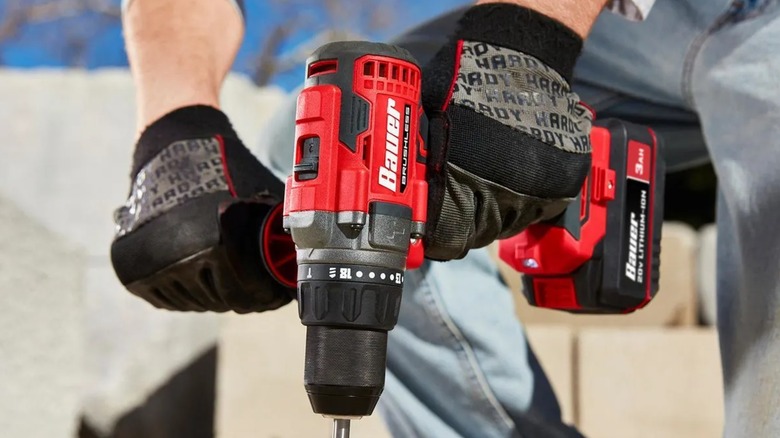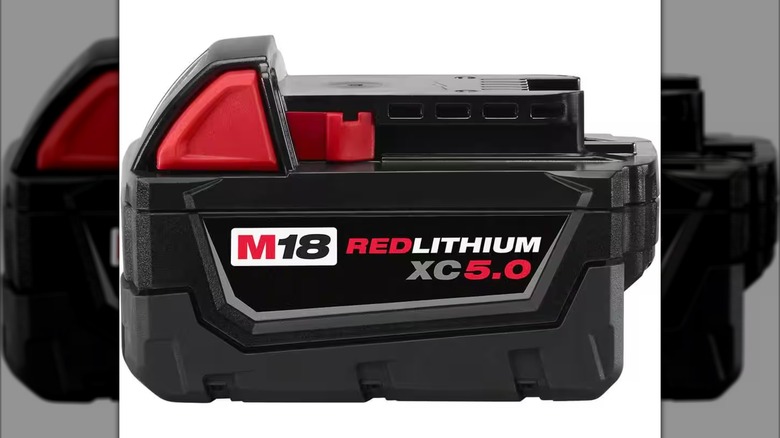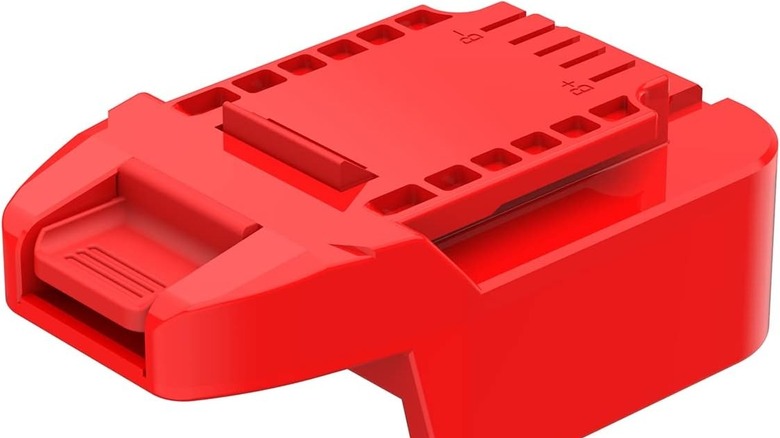Can You Use Milwaukee Batteries On Harbor Freight Tools?
We may receive a commission on purchases made from links.
The Harbor Freight hardware chain offers a wide variety of tools and accessories for its many in-house brands, with standouts including Bauer, Hercules, and others. These power tool brands and their respective systems operate similarly to those utilized by most major name-brand tool systems like Milwaukee; their rechargeable battery packs are clipped directly onto cordless tools to deliver variable levels of power. Given that similarity, it wouldn't be unreasonable to attempt to use a battery you already have from Milwaukee on one of Harbor Freight's tool systems.
While this corporate crossover makes sense on paper, there are various factors that prevent it from working in reality, including internal technical differences, legal distinctions, and perhaps most importantly of all, the simple shape of the batteries and their connectors, as well as the connectors on the tools. Due to these differences, Milwaukee batteries simply cannot be used on any of the tools sold at Harbor Freight, at least not natively. Technically, you may be able to obtain a battery adapter from a third-party that could facilitate a flush fit, but attempting to circumvent technological limitations like that could spell trouble for both your tools and your wallet.
Milwaukee batteries aren't compatible with any Harbor Freight tools
Milwaukee's M18 tool system has similar-looking batteries to those offered by Harbor Freight brands like Bauer and Hercules at a quick glance. Milwaukee, Bauer, and Hercules batteries are all designed to snap onto a designated receiver on a tool, and all provide roughly the same amount of power, ranging from 12 to 20 volts at various amperage hours. While the broad functionality of these batteries is the same, though, the devil is in the details, specifically within the connector panels and rails on top of each.
For example, let's compare a Milwaukee M18 18V 5Ah battery to a Bauer 20V 5Ah battery and a Hercules 20V 5Ah battery. The top of the Milwaukee battery has a mouth-like panel, with five divots concealing the charging terminals and two horizontal fang-shaped connecting rails on the sides. The Bauer battery also has five divots hiding its terminals, but they stick further out than the divots on the Milwaukee battery with reverse-angled connecting rails. The Hercules battery only has four divots, which are spaced further apart, as well as connecting rails that bend at wide angles.
These physical differences effectively ensure that a Milwaukee battery could never properly connect to a Bauer or Hercules tool. The different shape of the connecting rails would prevent a flush fit on a Harbor Freight tool's receiver, and the different positioning of the terminals means that the power has no way to flow from the battery to the tool.
There are unofficial battery adapters, but using them can cause problems
As annoying as this physical disconnect may be, you have to remember that hardware brands enforce these differences to protect themselves legally. If Milwaukee were to create a battery that could attach to one of Harbor Freight's tools without the latter's consent, it would result in an absolute legal nightmare. That said, while the brands themselves won't play ball, there are unofficial avenues for facilitating connections. For nearly every power tool brand out there, there are also unofficial, third-party battery adapters sold on platforms like Amazon. These adapters are made to connect two specific brand products together, such as Milwaukee and Bauer or Milwaukee and Hercules.
Connecting a Milwaukee battery to a Harbor Freight tool in this manner will get the power flowing, but there's a big problem. Within Milwaukee batteries are small RedLink circuit boards, which directly interface with a connected tool to deliver power in a manner best suited for that particular tool's operation. When you connect a Milwaukee battery to another brand's tool via an adapter, that circuit board is completely bypassed, forcing electricity to flow with little to no optimization. It's kind of like trying to open a stuck bottle by smashing a hole in the side.
With power flowing unoptimized like this, one of two scenarios can occur: the power may be insufficient for the tool's needs, resulting in underwhelming, undervolted performance, or the power may be far too much for the tool to handle. The latter scenario could result in an overload, burning out the tool's motor completely. If either your tools or batteries are damaged due to the use of unofficial accessories, neither Milwaukee nor Harbor Freight will provide any support, as third-party accessories void their warranties.


